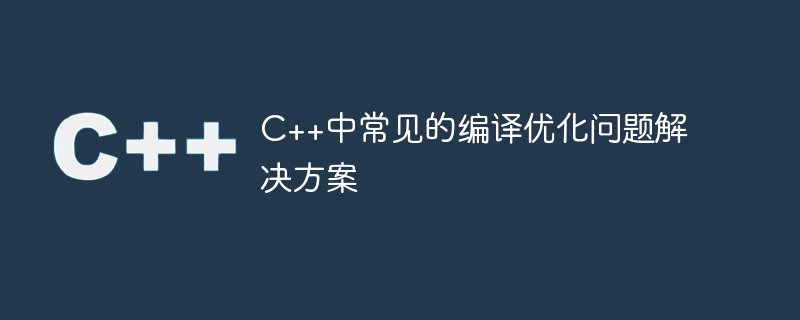Home >Backend Development >C++ >Solutions to common compilation optimization problems in C++
Solutions to common compilation optimization problems in C++
- 王林Original
- 2023-10-09 12:04:411527browse

Solutions to common compilation optimization problems in C
Abstract: When writing programs in C, we often encounter some performance bottlenecks that affect the running efficiency of the program . In order to improve the execution efficiency of the code, we can use the compiler to optimize. This article will introduce some common compilation optimization problems and their solutions, and give specific code examples.
1. Loop optimization
In C, loops are an important part of the program. The code in the loop is executed many times, so the optimization of the loop has a great impact on the performance of the overall program.
- Unroll the loop
By unrolling the loop, we can reduce the number of iterations of the loop, thereby increasing the execution speed of the program. For example, we can expand a loop into multiple loops, thereby reducing the number of loop iterations. The following is a sample code for unrolling a loop:
for (int i = 0; i < 10; i++) {
// 循环体
}
// 展开循环
for (int i = 0; i < 10; i+=2) {
// 循环体
// 循环体
}- Loop invariant external mention
Inside the loop, there may be some constant variables, and the values of these variables change each time It's the same when iterating. In order to reduce the calculation inside the loop, we can mention these invariants outside the loop. The following is a sample code for loop invariant extraction:
int sum = 0;
for (int i = 0; i < 10; i++) {
// 循环体中的计算
sum += i;
}
// 循环不变量外提
int sum = 0;
int i;
for (i = 0; i < 10; i++) {
// 循环体中的计算
sum += i;
}2. Function call optimization
Function calls are common operations in programs, but function calls will cause some additional overhead. The performance of the program has a greater impact. Two methods of function call optimization are introduced below:
- Inline functions
Inline functions can eliminate the overhead of function calls by inserting the function code directly into the calling point. A function can be declared as inline by preceding the function definition with theinlinekeyword. The following is a sample code for an inline function:
inline int add(int a, int b) {
return a + b;
}
// 调用内联函数
int result = add(1, 2);- Function parameter reference passing
In function calls, the passing of parameters will cause data to be copied, adding additional overhead. To reduce this overhead, we can declare the parameters to be passed by reference. The following is a sample code using reference passing:
void swap(int& a, int& b) {
int temp = a;
a = b;
b = temp;
}
// 调用函数
int x = 1, y = 2;
swap(x, y);3. Memory optimization
Memory access is an important part of the program execution process. There are some potential performance problems in memory access. , needs to be optimized.
- Local variable optimization
When writing a program, reasonable use of local variables can reduce access to memory and improve the execution efficiency of the program. For example, we can use local variables to store some frequently used data, thereby reducing memory access. The following is a sample code for local variable optimization:
void calculate() {
int value1 = 1;
int value2 = 2;
int result = value1 + value2;
// 使用result进行其他计算
}- Data alignment
Data alignment can improve memory access efficiency. In C, you can use thealignaskeyword to specify the alignment of data. The following is a sample code for data alignment:
struct alignas(16) MyStruct {
char data[16];
};
// 访问对齐的数据
MyStruct myStruct;Conclusion:
By optimizing loops, function calls, and memory access, we can significantly improve the execution efficiency of C programs. In actual programming, we need to choose the appropriate optimization method according to the specific situation, and comprehensively consider the readability and performance of the code. I hope the introduction in this article will be helpful to readers in writing efficient C code.
References:
- https://www.codeproject.com/Articles/6154/Want-speed-Use-Inlining
- https://www .codeproject.com/Articles/20628/Parameters-Pass-by-Value-vs-Pass-by-Reference-vs-P
- https://stackoverflow.com/questions/9096118/c-what- does-alignas16-do
The above is the detailed content of Solutions to common compilation optimization problems in C++. For more information, please follow other related articles on the PHP Chinese website!
Related articles
See more- C++ compilation error: A header file is referenced multiple times, how to solve it?
- C++ compilation error: wrong function parameters, how to fix it?
- C++ error: The constructor must be declared in the public area, how to deal with it?
- Process management and thread synchronization in C++
- How to deal with data splitting problems in C++ development

